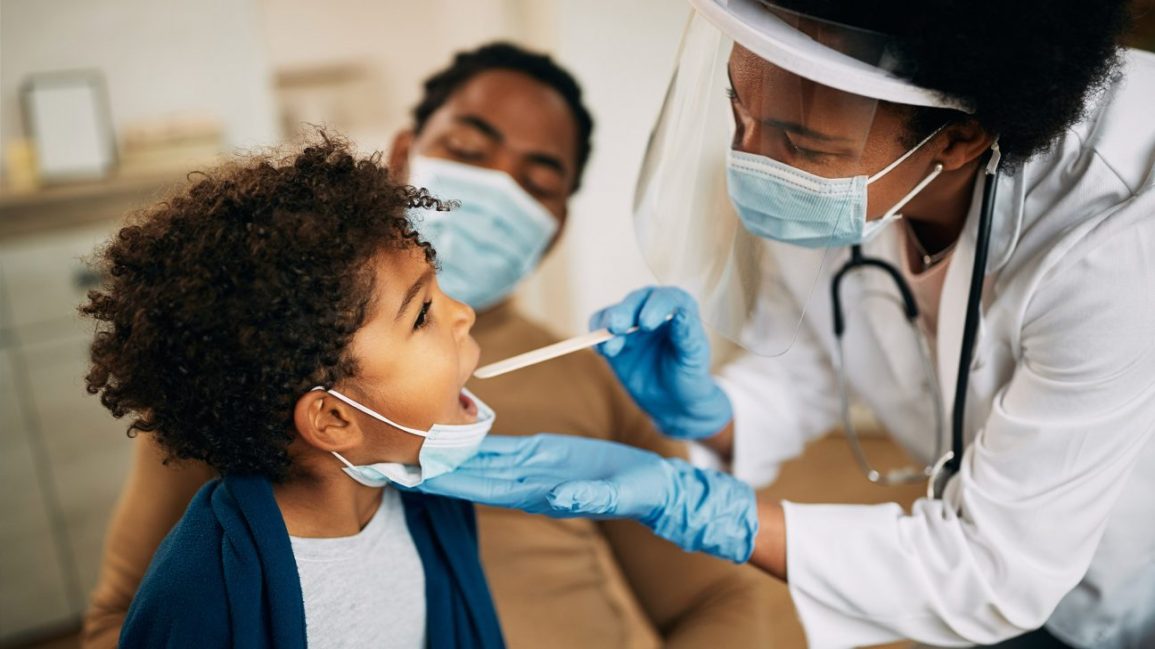COVID-19 Vaccines for Kids Ages 5 to 11, Here’s What to Know

November marks a monumental milestone in the battle against COVID-19. The U.S. Food and Drug Administration (FDA) expanded its emergency use authorization (EUA) for the Pfizer-BioNTech vaccine to children ages 5 to 11.
This means, all children over the age of 5 are eligible to receive a COVID-19 vaccination. Pfizer is the only COVID-19 vaccine maker with full Food and Drug Administration (FDA) approval for people ages 16 and older.
Parents have been eagerly awaiting this news, especially since many kids are back to in-person learning this past fall. Coincidentally, this summer and fall, the U.S. saw its largest surge in COVID-19 cases and hospitalizations among children—more than at any time during the pandemic.
“The EUA for the Pfizer vaccine for children age 5-11 fills a large gap in our ability as health care providers to overcome the COVID-19 pandemic,” said Russell Horton, DO, a pediatrician at Banner Health Center in Queen Creek, AZ. “Thankfully, children have not been the most severely affected by COVID-19 thus far. However, recent variants have been affecting children more and placing them at higher risk of hospitalization and serious harm. This vaccine, like all childhood vaccines, will significantly decrease the very real risk to children while also preventing further spread to people of every age.”
If you have a child between the ages of 5 and 11, here’s a guide to what we know about COVID-19 vaccines for this age group.
Is the COVID-19 vaccine safe for children?
Clinical trials have shown the Pfizer vaccine to be both safe and effective when used to prevent COVID-19 in children ages 5 to 11.
Were COVID-19 vaccine clinical trials rushed?
The clinical trials for the COVID-19 vaccines have all been done with the same care and requirements applied to any previous FDA approved vaccine. Under the emergency circumstances of the pandemic, the review processes were made more efficient. This in no way means that any shortcuts were taken or that any data collection or safety monitoring was shortened. The trials for the 5-11-year age group included a large number of patients covering multiple backgrounds that provide excellent data.
As of October 2021, more than 6.55 billion doses have been administered across 184 countries, but most importantly, the vaccines have been shown time and again to be safe and effective in people ages 18 and over.
Another factor that should be reassuring for parents is the robust reporting system, VAERS, the U.S. has put in place to detect vaccine safety issues and side effects.
“The VAERS (Vaccine Adverse Event Reporting System) has long been an extra layer of protection and monitoring that should bring a sense of comfort to all patients receiving any vaccine,” Dr. Horton said. “Through VAERS any vaccine adverse event can be reported and monitored. This means that should a troubling previously unknown side effect begin to emerge, it would be quickly recognized and acted upon.” A report can be made to VAERS by anyone and all health care providers are required to make a report if an event occurs.
Is the vaccine dose for children ages 5 to 11 different than people 12 and older?
The dosage for the Pfizer vaccine includes two doses of 10 micrograms each, 21 days apart. This is a smaller dose than the 30 micrograms used for those 12 years and older. Children in the clinical trial achieved an effective immune response comparable to the antibody levels seen in earlier trials for those 16 to 25 years of age.
Are the side effects different in children than adults?
Children ages 5 to 11 who received the Pfizer COVID-19 vaccine had side effects similar to those experienced by people aged 12 and older. These include pain where the shot was given, fatigue, headaches, muscle and joint pain and fever. Local and systemic reactions were less in the 5-11-year-old patients that received the 10-microgram dose compared to patients 16–25-years-old who received the 30-microgram dose. Side effects are usually mild and should only last 1 to 2 days.
Can the COVID-19 vaccine affect my child’s heart?
You may have heard news about a small number of male adolescents and young adults aged 16 and older who experienced mild cases of heart inflammation, known as myocarditis, after receiving the COVID-19 vaccine. But a study from the New England Journal of Medicine found myocarditis post-vaccination to still be extremely rare – one to five cases per 100,000 people vaccinated. In fact, getting infected with COVID-19 itself is much more likely to cause myocarditis than the vaccine. This vaccine significantly reduces the risk of developing myocarditis from the COVID-19 infection.
Of the cases reported, the problem happened more often after the second dose of the vaccine and typically within several days after the vaccination. Most of the people who received care quickly felt better after receiving medicine and resting.
Can the COVID-19 vaccine affect my child’s future fertility?
According to the American Academy of Pediatrics, “Unfounded claims linking COVID-19 vaccines to infertility have been scientifically disproven. There is no evidence that the vaccine can lead to loss of fertility. While fertility was not specifically studied in the clinical trials of the vaccine, no loss of fertility has been reported among trial participants or among the millions who have received the vaccines since their authorization, and no signs of infertility appeared in animal studies. Similarly, there is no evidence that the COVID-19 vaccine affects puberty.”
Can I give my child Tylenol or Advil before their vaccination to prevent side effects?
The CDC advises against giving your child pain-relieving medications like acetaminophen or ibuprofen before getting the vaccine because it may reduce the immune response to the vaccine. However, if your child develops a fever or experiences pain afterward, it is acceptable to provide pain-relieving medication at the appropriate dose unless indicated otherwise by their doctor.
My child has allergies. Can they still receive the COVID-19 vaccine?
According to the CDC, if your child has had a severe allergic reaction to any of the ingredients in the vaccine, they shouldn’t take it. This goes for adults as well. Find the ingredients for the Pfizer vaccine on the FDA fact sheet.
If your child has a history of anaphylaxis or other severe allergies, then experts recommend waiting 30 minutes for observation after the infection. Additionally, children who are prescribed an EpiPen for any reason should bring it with them to their appointment.
Can my child get the COVID-19 vaccine with other shots?
Yes, your child may get other vaccines when they go in to get their COVID-19 shot, including the flu shot. It’s important for children and adolescents, especially those who are due for other childhood vaccinations or who’ve fallen behind, to stay on track with the recommended schedule.
Previously, the CDC said those receiving the COVID-19 vaccine should wait two weeks before or after the shot, but the initial restriction was a precautionary measure in the early days of the vaccine distribution. There is no risk receiving multiple vaccinations at one time.
“Our immune system is an incredible and complex system that is designed to tackle hundreds if not thousands of different substances during a day,” Dr. Horton said. “From the things we touch to what we breathe or eat, our immune system processes all of them and creates appropriate responses and defenses. The addition of these few antigens in the form of vaccines is not going to overwhelm our bodies.”
My child already had COVID-19, is it really necessary to get the vaccination?
Regardless of whether your child has had COVID-19, every person—no matter their age—should receive the COVID-19 vaccination. This is because the vaccine provides additional protection by reducing the risk of a repeat COVID-19 infection.
The CDC has advised that you wait for your child to recover from acute illness, and isolation has been discontinued, before your child gets their first dose. This way their body can build up natural antibodies against the virus and have the added protection of the vaccine when administered.
Severe illness is rare in children, so why not just wait for my child’s vaccination?
Recent surges have seen an increase in the number of children contracting COVID-19 and an increase in the number of children being hospitalized. While your child is less likely to develop a severe illness as a result of contracting COVID-19, they are still at risk. One serious complication of COVID-19 to be on the lookout for in children is multisystem inflammatory syndrome (MIS-C).
“MIS-C, myocarditis, respiratory distress and long COVID-19 symptoms are all real possibilities for children, and it is often hard to predict which child may fall victim to these complications,” Dr. Horton said. “With this vaccine we have a very low risk way to avoid this fate.”
Unvaccinated children can also pose a risk to others. Even if they don’t become ill, your child can spread the virus to family members, teachers and others who may be at greater risk for severe disease or death.
Vaccines are arguably the greatest health care advancement in history. They represent a miracle of modern science that has saved untold lives. “The benefit of immunizations is that they protect us from some of the most serious infections while also building a protective shield around the communities we live in,” said Dr. Horton. “Together we all face the tiny sting of the needle, but in return we live in a society that does not know the daily heartache of past generations. We protect our children through immunization so that they will also protect others.”
“If we fail to keep up this effort, then the shield cracks and we return to a much darker time,” advised Dr. Horton. “As a pediatrician the COVID-19 vaccine, including the Pfizer vaccine for children 5-11 years old, is another in a long line of gifts that we should not take for granted.”
[“source=bannerhealth”]




